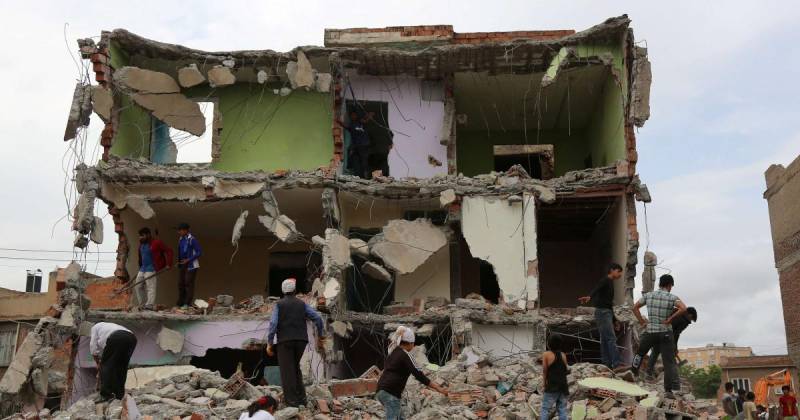After a long time away, I once again find myself in the city of Şırnak, capital of the southeastern Turkish province of the same name. It is also known as Nuh, which is Kurdish for Noah, the biblical prophet who built an ark to save the world’s creatures.
Security checkpoints and observation towers along the main road from the towns of Nusaybin to Cizre have become more frequent as the Turkish army steps up operations against Kurdistan Worker’s Party (PKK) insurgents in the mostly Kurdish region.
According to a local proverb, getting into Şırnak is harder than entering a foreign country. The lines of traffic at the entrance to the city bring home that feeling.
As soon as I enter, my eyes are drawn to the big banners everywhere, reading “Big Change, Big Transformation: The City of Noah is Coming Back to Life!” along with 10-metre-tall Turkish flags and posters of President Recep Tayyip Erdoğan. There are big half-finished buildings and piles of rubble around. Şırnak has become one big construction site.
The city I last saw a year-and-a-half ago is completely unrecognisable, in fact I cannot find anything familiar. There are tall buildings with over a dozen floors built by the Public Housing Development Administration (TOKİ), going up all over the place. Whatever was left of the Şırnak I knew has been erased. A new, completely different city is being built.
The TOKİ buildings are nearly complete. They are up to a dozen floors. In total, around 6,000 TOKİ apartments are being constructed. It is not clear when these houses will be occupied or by whom.
The original handover date was the end of 2018, but it is common to hear there may be a delay until just before the March 2019 local elections. Due to a housing shortage, more than 40,000 people out of Şırnak’s population of 65,000 are being accommodated in nearby towns.
Of all the cities in the southeast, Şırnak has been the most affected by the Turkish army’s siege tactics in its latest offensive against the PKK, which began in late 2015. Some 75 percent of the city was destroyed in fighting between security forces and the PKK’s youth wing, and in the demolitions that followed. Residents I met said only about 200 houses needed to be rebuilt, but the state had demolished nearly all of the city.
There are rumours that even fully intact buildings were intentionally hit with bulldozers then declared structurally unsound so that certain local businessmen from families close to the government could be awarded contracts to demolish and rebuild them.
The mayor appointed to lead Şırnak by the ruling party, as in other cities, is taking a personal interest in the city’s appearance. Flowers have been planted in the medians and traffic islands, the streets have new streetlights and sections of newly built walls are marked “reserved for artistic work”.
I have been visiting local families. Many of them are afraid to talk. Everyone is under intense pressure. Tanks and armoured police vehicles could show up at a moment’s notice. Everyone is seething, but silent.
The siege and accompanying curfew were a bit different here than in other provinces. Rumours that a curfew would be put in place started months before the official announcement. This tactic was also used in nearby Cizre and Silopi to instil fear and apprehension.
Even before the siege and curfew began, most people had left their homes and got out of town. Those who had held out left when the curfew was began on March 14, 2016. Nearly everyone I met said that if people had managed to unite they would not have left the city, their sons and daughters would not have died and the city would not have been demolished. The people of Şırnak are angry, but above all they are angry with themselves.
“At least I could have stayed in my neighbourhood and died with my son,” said one mother.
The total number of dead is still unknown, but it is more than 100. Most were from the Kurdish Youth militia, the YPS. Many of the dead still have not been given a proper burial, and mothers said their funerals had been prevented.
Some families said they had been given a body to bury, only to learn later that it was not their son. Most have been unable to seek any legal solution to the issue since there are no organisations to support them. A feeling of isolation rules.
The pro-Kurdish Peoples’ Democracy Party cannot support the people because the party itself is in a shambles following the arrest of many of its leaders. In addition, the press is prohibited from mentioning the events in Şırnak. Even if they could, words could not describe it. Many are preoccupied, wondering how they could have prevented Şırnak from being destroyed.
As I walked with a resident past the big banners, she pointed to the TOKİ building.
“Nurcan, look at all these buildings. They all look the same. They wrote ‘We’re bringing the City of Noah back to life’ everywhere, but the animals in Noah’s ark didn’t all look the same. There were all kinds inside. They don’t even realise that.”
